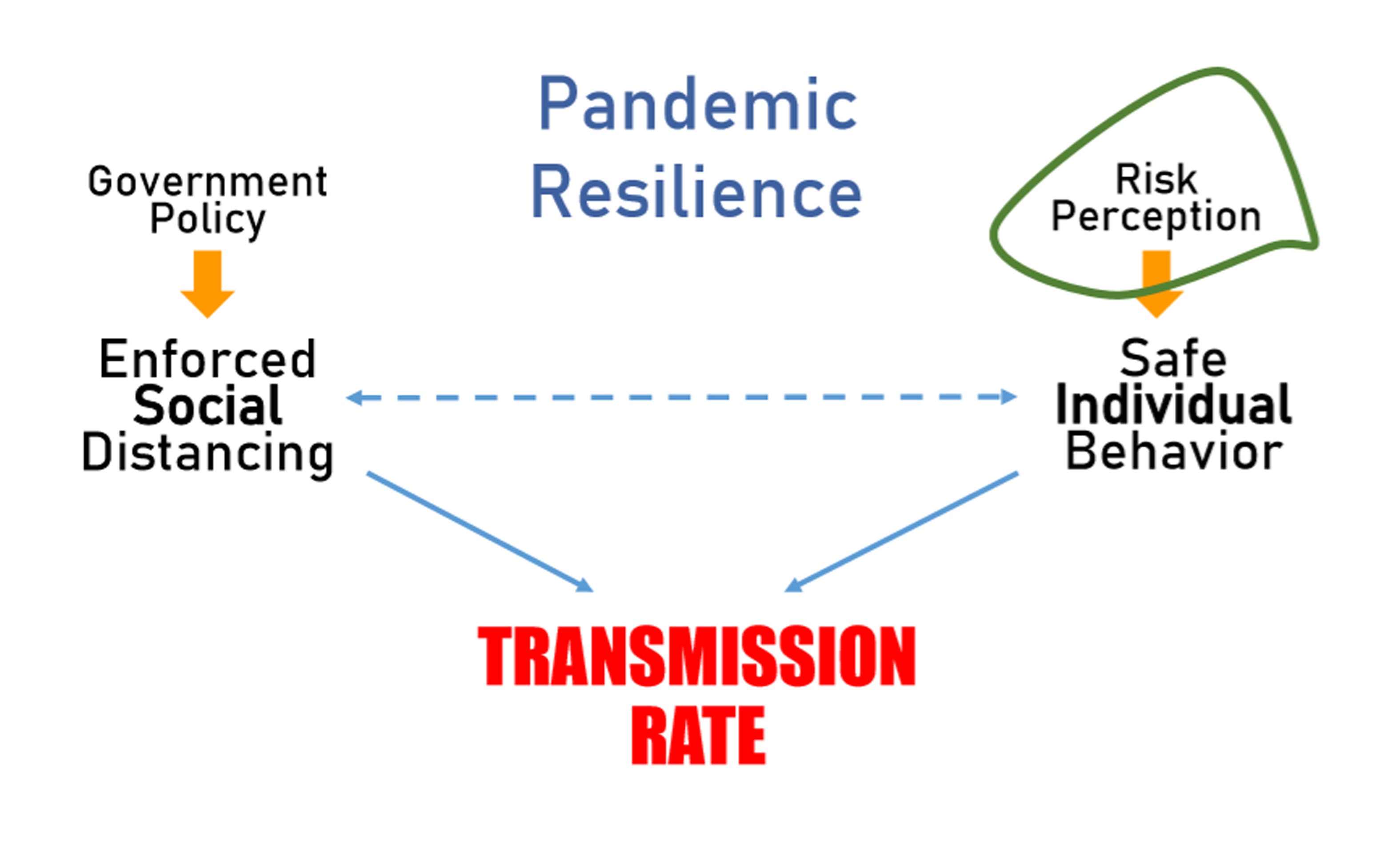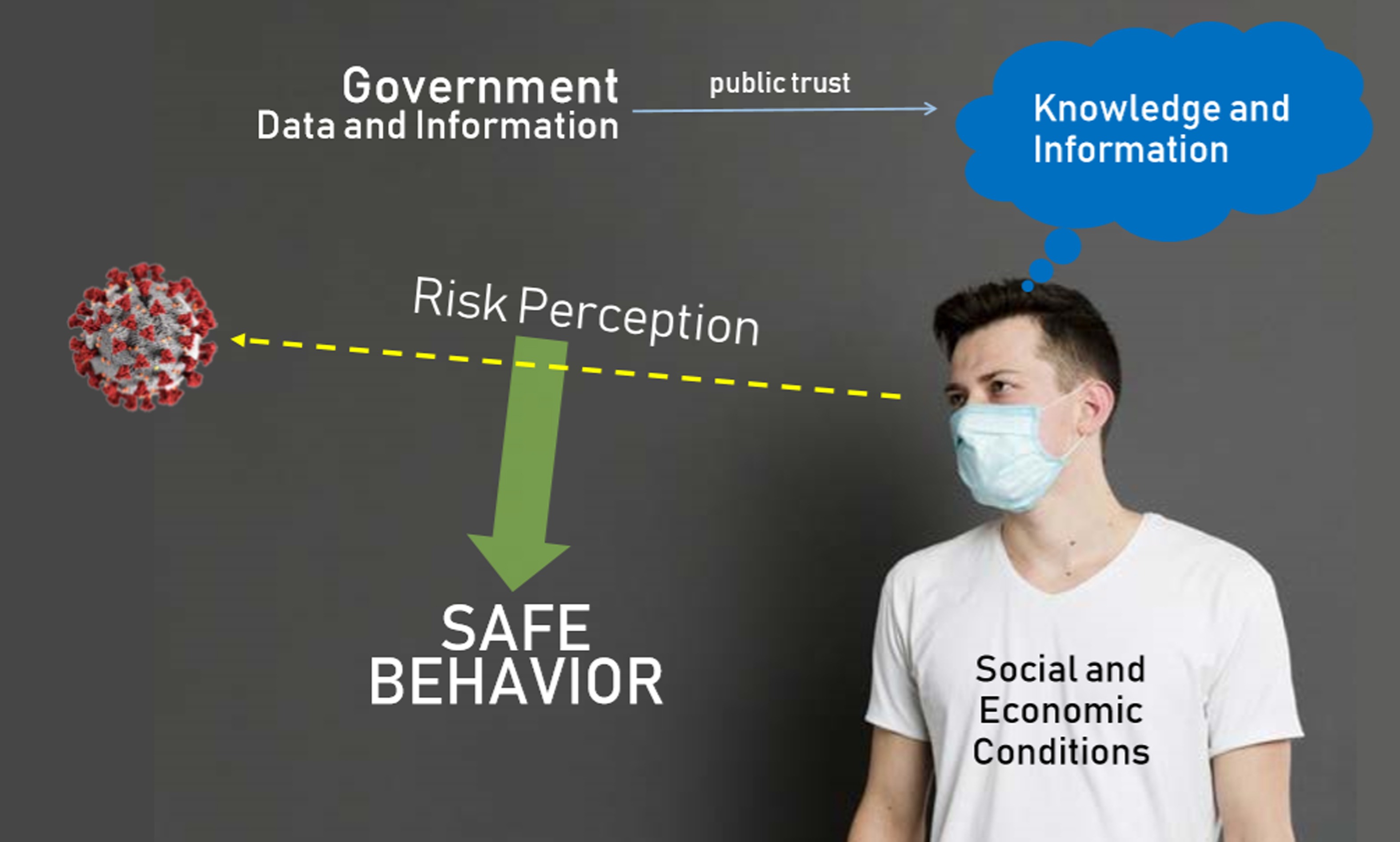How is Our Preparedness in Facing the New Normal?

Illustration of elements of pandemic resilience
ITS Campus, ITS News — The COVID-19 pandemic did not only cause health problems, but also socio-economic issues. Giving emphasis to this, the Department of Developmental Studies of Institut Teknologi Sepuluh Nopember (ITS) held an open discussion forum entitled Development Talk featuring Sulfikar Amir, Associate Professor at Nanyang Technological University. In this third edition, the ITS Developmental Studies Department wanted to give an overview of Indonesia’s preparedness in implementing New Normal.
COVID-19 pandemic has not subsided yet. This virus maintained haunting the global community and breaking down the pillars of the world economy. Seven months after it first blasted, several countries already showed their success in dealing with the pandemic and indicated a stable condition with drastic reductions in transmission rates. But there are also countries with an increasing number of positive cases.
Several countries in the world have imposed a total or partial lockdown to stop mass crowds that have the potential to be a source of virus spread. School lockdowns, repatriation of workers from workplaces, and bans on opening non-essential shopping centers are a few examples of the new policies implemented. But with the continuation of this problem, new issues will transpire, namely social and economic sector instability.
In response to this, the term New Normal appear, which means the state of adapting to the environment in the form of behavior change in order to return to normal activities whilst promoting health protocols. Following that, a question then arises about what standards must be met so that an area can be declared ready to apply this New Normal period.
According to Sulfikar, there are five pillars in the implementation of New Normal, namely the maximization of COVID-19 test capacity, close supervision, strong contact tracking, the capacity of health facilities, and public insight about the risks. It requires deep cooperation between the people and the government. “The role of the community in regards to this is to comply with all health protocols and to increase knowledge on the COVID-19 pandemic effects,” stated this man who completed his degree at Institut Teknologi Bandung (ITB).
Examining Daerah Khusus Ibukota (DKI) Jakarta as the subject, Sulfikar analyzed the level of public awareness on the effects of the COVID-19 pandemic in the area. He used Spearman’s correlation analysis with knowledge, economics, self-protection, information, social capital, and risk insight, as his variables. From this study, he concluded that from a scale of 1 to 5, the awareness of the COVID-19 effects of the people of DKI reached 3.46.
“This result has not yet reached the minimum standard, at least the public awareness index of pandemic risks must reach the number four for a region to be claimed ready to face the New Normal,” revealed this man who completed his doctoral studies at the Rensselaer Polytechnic Institute.

Illustration of the relationship between government and community cooperation to reduce transmission rates of COVID-19
Furthermore, Sulfikar gave an illustration of the relationship between the government and the community in responding to COVID-19 that can avoid economic paralysis. The government, as the policymaker, is hoped to direct the public using an actual database so that the public is better educated and received the latest and factual information with ease. This provision is expected to be the foundation of the public’s awareness to encourage safe behavior in accordance with health protocols.
The method was proven in countries that have now managed to control the COVID-19 pandemic, for example, South Korea. The social element, which indicated the level of South Korean people’s adherence to health protocols based on their full awareness of the COVID-19 pandemic risks, served as the key to reduce transmission rates.
“So as to build the resilience of a region from the COVID-19 pandemic, what must first be realized is the safe habit of each individual and strict enforcement of social distancing policies to reduce the rate of virus transmission,” emphasized this man who is the author of the book entitled The Technological State in Indonesia: the Co-constitution of High Technology and Authoritarian Politics.
The New Normal phase can backfire if the community continued to not have awareness and insight on the COVID-19 risks. Instead of restoring economic power, regions forced to undergo New Normal may face the second wave of the COVID-19 pandemic. So in this case, the government, as a policymaker, should prepare and analyze carefully before taking a step forward. (ram/lut/ory/ITS Public Relations)
Related News
-
ITS Lecturer Introduces Madurese Culture to the International Stage
ITS Campus, ITS News — Continuing to show local wisdom to the world community, this time a lecturer from the Department
July 27, 2020 21:07 -
ITS Researchers Remind TKDN is Crucial for Economic Independence
ITS Campus, ITS News — The Domestic Component Level (TKDN) is the key to restoring the glory of the Indonesian
July 27, 2020 21:07 -
Strengthening Quality Education, ITS Professor Develops Adaptive Technology for Students
ITS Campus, ITS News — Differences in students’ abilities in understanding lessons are often a challenge for teachers in the classroom.
July 27, 2020 21:07 -
ITS Graduates Create Reverse Logistics Model for PET Plastic Waste Recycling
ITS Campus, ITS News — Doctoral graduate from the Department of Industrial and Systems Engineering, Sepuluh Nopember Institute of Technology (ITS) Dr. Yuniar
July 27, 2020 21:07
